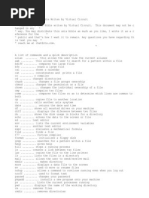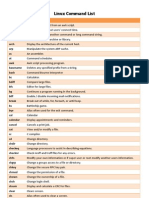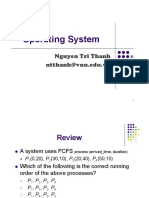0 ratings0% found this document useful (0 votes)
28 viewsLinuxcommands Cheatsheet
Uploaded by
prathvik.gs01Copyright
© © All Rights Reserved
Available Formats
Download as PDF, TXT or read online on Scribd
0 ratings0% found this document useful (0 votes)
28 viewsLinuxcommands Cheatsheet
Uploaded by
prathvik.gs01Copyright
© © All Rights Reserved
Available Formats
Download as PDF, TXT or read online on Scribd
You are on page 1/ 2
1. alias - Abbreviate a command sequence.
2. expr, bc, awk - Arithmetic computation non-interactively.
3. (( )) or let - Arithmetic computation using the shell.
4. set - Assign values to positional parameters.
5. tar - Back up files specified in the command line.
6. head - Beginning of file.
7. tr - Change case of text.
8. cd dirname - Change current directory to dirname.
9. cd or cd $HOME - Change current directory to home directory.
10. basename, expr - Change filename extension.
11. chgrp - Change file's group ownership.
12. touch - Change file's last modification or access time.
13. chown - Change file's ownership.
14. chmod - Change file's permissions.
15. passwd - Change own password.
16. pwd - Check current directory.
17. man - Command documentation.
18. history - Command history.
19. type - Command type (external, internal, or alias).
20. bzip2 - Compress file (to .bz2).
21. gzip - Compress file (to .gz).
22. zip - Compress multiple files to a single file (to .zip).
23. cat - Concatenate files.
24. cp -r - Copy directory tree.
25. cp - Copy file.
26. ftp, scp, sftp - Copy file between machines.
27. grep -c - Count number of lines containing a pattern.
28. wc - Count number of lines, words, and characters.
29. ar - Create an archive of C object files.
30. ln - Create links to a file.
31. ln -s - Create symbolic links to a file.
32. cut - Cut columns or fields from a file.
33. sleep - Delay command execution in a script.
34. diff - Difference between two files (as sed-like instructions).
35. ``ls -l | grep "^d"` - Directory list.
36. du - Disk space utilization.
37. top - Free space in memory and swap.
38. read - Input data to shell script interactively.
39. paste - Join two files laterally.
40. kill - Kill job.
41. ``grep -E, egrep, fgrep` - Lines containing one or more of multiple patterns.
42. grep - Lines containing a pattern.
43. sort - Lines in ASCII collating sequence.
44. sort -n - Lines in numeric sequence.
45. tail -r - Lines in reverse order.
46. sort -f - Lines sorted ignoring case.
47. uniq -d - Lines that are repeated.
48. uniq -u - Lines that occur only once.
49. ssh - Log in to a remote machine.
50. make - Maintain a group of C programs.
51. tail -f - Monitor growth of a file.
52. mv - Move files to another directory.
53. bg - Move job to the background.
54. fg - Move job to the foreground.
55. sed - Multiple segments from a file.
56. hostname - Name of the local host.
57. uname - Operating system name.
58. uname -r - Operating system release.
59. export - Pass variable value to sub-shell.
60. tr -s - Squeeze multiple spaces to a single space.
61. expr - String length.
62. tr - Substitute one character for another.
63. sed - Substitute one pattern for another.
64. su - Superuser from a nonprivileged account.
65. date - System date.
66. top - System memory usage.
67. who -r, runlevel - System run level.
68. kill - Terminate process.
69. exit, logout - Terminate shell script.
70. ping - Test connectivity of host.
71. bunzip2 - Uncompress .bz2 file.
72. gunzip - Uncompress .gz file.
73. unzip - Uncompress .zip file.
74. umount - Unmount file system.
75. who - Users and their activities.
You might also like
- Network As A Service (Naas) Playbook: 1. TX Network High-Level Design100% (1)Network As A Service (Naas) Playbook: 1. TX Network High-Level Design503 pages
- All-In-One Robot Education: Dobot Product CatalogNo ratings yetAll-In-One Robot Education: Dobot Product Catalog32 pages
- Me Lay Ubuntu - Linux Bash Command - PDF.HTMLNo ratings yetMe Lay Ubuntu - Linux Bash Command - PDF.HTML2 pages
- Here's An A-Z of Handy Linux Commands!: Rate This News: (1 Votes)No ratings yetHere's An A-Z of Handy Linux Commands!: Rate This News: (1 Votes)5 pages
- Todos Os Comandos Básicos de A A Z - KaliNo ratings yetTodos Os Comandos Básicos de A A Z - Kali16 pages
- An A-Z Index of The Command Line For LinuxNo ratings yetAn A-Z Index of The Command Line For Linux7 pages
- Linux Command Cheat Sheet With 100 Commonly Used CommandsNo ratings yetLinux Command Cheat Sheet With 100 Commonly Used Commands6 pages
- The Basic Linux Commands: Mkdir - Make DirectoriesNo ratings yetThe Basic Linux Commands: Mkdir - Make Directories8 pages
- Openvms Commands With Unix Equivalents: Vms CommandNo ratings yetOpenvms Commands With Unix Equivalents: Vms Command8 pages
- Bash Shell from Zero to Hero: An SRE's Practical Guide to Terminal Skills, Scripting, and AutomationFrom EverandBash Shell from Zero to Hero: An SRE's Practical Guide to Terminal Skills, Scripting, and AutomationNo ratings yet
- Configuration of a Simple Samba File Server, Quota and Schedule BackupFrom EverandConfiguration of a Simple Samba File Server, Quota and Schedule BackupNo ratings yet
- Linux System Administrator Interview Questions You'll Most Likely Be AskedFrom EverandLinux System Administrator Interview Questions You'll Most Likely Be AskedNo ratings yet
- UNIX Shell Programming Interview Questions You'll Most Likely Be AskedFrom EverandUNIX Shell Programming Interview Questions You'll Most Likely Be AskedNo ratings yet
- UNIX Shell Scripting Interview Questions, Answers, and Explanations: UNIX Shell Certification ReviewFrom EverandUNIX Shell Scripting Interview Questions, Answers, and Explanations: UNIX Shell Certification Review4.5/5 (4)
- A Guide To Creating Digital Portraits - Faa 208No ratings yetA Guide To Creating Digital Portraits - Faa 20813 pages
- Computer Applications Technology Study GuideNo ratings yetComputer Applications Technology Study Guide178 pages
- Computer Science and Applications: Paper-IiiNo ratings yetComputer Science and Applications: Paper-Iii12 pages
- Digital India : Team Members: Karishma ChaudhariNo ratings yetDigital India : Team Members: Karishma Chaudhari14 pages
- Mesh Analysis and Nodal Analysis: Mapúa UniversityNo ratings yetMesh Analysis and Nodal Analysis: Mapúa University9 pages

























































































